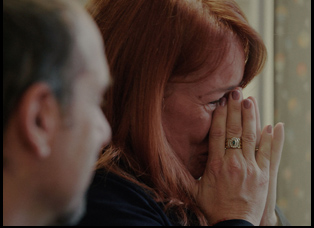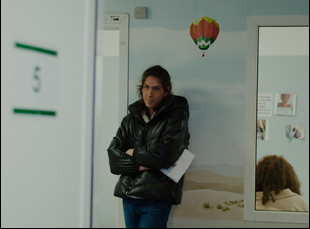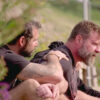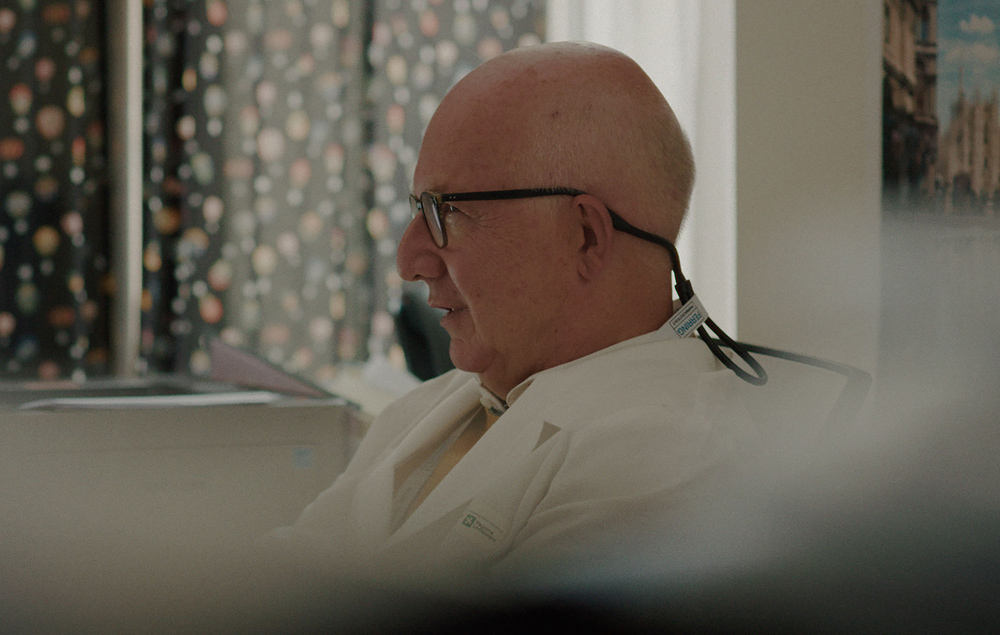Gianaluca Materrese always knew that to address big issues, you’ve got to start small. In his debut feature “Everything Must Go,” he turned his camera on his own family to observe the economic crisis in Italy through the lens of the turn their shoe business took, and his follow-up “The Last Chapter” may have begun as a dialogue between himself and a BDSM master who was retiring, but opened up an entire conversation about the AIDS epidemic that the latter survived in the 1980s.
“For me, making a film is always an encounter. I’m not an economist, a politician, an anthropologist, or a sociologist,” said Matarrese. “Maybe I could be because I like society and humans, but I’m not an academic. What I do is tell stories and through the story, I can have a political [impact]. But I’m not making a statement or advocating for anything. It’s always very hard when I’m asked details on the bigger picture, but I always answer, ‘I made the film, and that’s my answer in a way.’”
That generous approach to let others do the talking is exemplified well in “Gen_,” a film set (almost) entirely inside the office of Dr. Maurizio Bini at Milan’s Niguarda Hospital as he consults with patients. The endocrinology department which he presides over is a surprising hotbed of activity these days when he handles all matters related to infertility and pregnancy, but also gender dysphoria and reassignment. Good humored and gregarious, the doctor is as skilled with putting people at ease as he is at handling their medical concerns, but it isn’t only the one-to-one relations he has to be conscious of these days, but the increasing external pressure in a country that elected the far-right Giorgia Meloni to office that could legally curtail his ability to provide care. (It is all too fitting that renovations are happening right outside his ward, requiring him to occasionally ask the construction workers to tone down their drilling.)
“Doctors sometimes have to make the decision between what is right and what is legal,” says Dr. Bini, unbothered at least on a professional level by the news reports he overhears on the way to work and ensures that the space he has control over puts his patients’ health first. The people that make their way into Dr. Bini’s office all have highly specific and individual needs, from a pregnant woman unable to travel when it would require her to return to Serbia to see her estranged father for her passport to a female prisoner looking to transition, accompanied by an armed police guard, but they all end up speaking to the necessity of a compassionate ear and a wisened perspective when it comes to matters of medicine. Opening up the doors to Materrese, Dr. Bini allows even more empathy into the room as couples fret about whether they’ll be able to have children or not or individuals express their desire to live without the medical issues that they’ve felt have held them back.
Shortly before “Gen_” premieres this week at Sundance as part of the World Cinema Documentary section, Matarrese graciously took the time to talk about a rare visit to a hospital that people will want to make, winning the support of Dr. Bini that could afford such intimate access and how the limitations of the production helped broaden the film’s horizons.

Well, this film wasn’t my idea. I was actually invited into this world by Donatella Della Ratta, the co-author of the film and a professor in the John Cabot University in Rome. She had this project of writing a book on these topics of fertility and transition alignment because these are the subjects she teaches and she went through fertility procedure herself in Rome. Her gynecologist advised her to meet Dr. Bini in Milan for research for a book and she asked me to go with her because she knows what kind of topics I’m interested in and she said, “You will see there will be probably a film there.” We met him and I already brought my camera because I usually do a lot of character study and filming at the beginning in order to prepare applications for financing. Very often this research material becomes the film and after the first morning we spent with the doctor, we found the film — the relationship between the doctor and the patients.
We found the angle right away because we were so surprised with the example of humanity we had in front of us. We could have [broadened the focus] on the entire service because there’s also the urologist, the psychologist, the laboratory and the operation room, so it could have been like a [Frederick] Wiseman-style film, and in the editing process, we also tried narration. But at the end of the day, I came back to the first feeling that I had to focus on the quality of exchange happening between the doctor and the patients. The film is not about the private lives of the patient or the doctor, but really the medical care between patients and doctor and the real call of being a doctor. That’s what Bini says. It’s always the border between what is right for the patient and what is legal, so [his work is] finding ways to make what is right for the patient legal. It’s also a celebration in a way of the public service, because it’s important to point out this is all taken care by the state. All these patients are taken care by the state under a very oppressive government in Italy, so it’s a bit of a contradiction and in Milan, a region run by Catholics in a country that is very conservative, so this place is really a miracle.
What was it like to actually meet Dr. Bini?
He’s a very [extroverted] character, so let’s say he couldn’t wait to be filmed. [laughs] He really likes debate and talk in public. He speaks many languages, he’s a one-of-a-kind professor and he also has a talk show on a radio network in Italy every Friday called, “Let’s Talk About Sex.” So he’s funny, and he loves cinema and literature. Right away, he gave us access to this intimacy [of being in his office], which is something really rare because you never have this privilege [to sit in] between a doctor and a patient. And from the very beginning, it was being very, very open, with no filter. I also think, thanks to his presence, the patients were also giving us the trust to be filmed because that was very touchy for them to open [up].
So it was really easy. You become friends very easily with [Dr. Bini], right away and at the beginning, you might be a little bit shocked on the way he talks about some certain topics. Because he’s a specialist, it’s like when you go into the doctor room, you hear the doctors talking about the patients and for someone who’s not in the business, it can be shocking to hear about the way he has to speak about the medicine. But then you get to know him, you understand the codes, the language, and you really start loving the way he’s so caring about his patients.

As you can imagine, I couldn’t have a big crew in the room. I also didn’t want to be unseen because this was not about being a voyeuristic point of view, so everybody was aware of my presence and the camera. I always had this image of me being a bird or a little mouse, sitting there, or a little mouse, and that’s why I really liked the idea of having the books or the papers all the time in front of me because I was respecting the safe space they have because that was really important. I also never filmed a patient frontal. It’s always on the side, so the camera could disappear. It’s not a camera. It’s just me being, and the audience is in the room at the same level of the conversation and all of us could be the patient, in a way.
We had to have the length to be there and not be there. For example, I couldn’t have a sound person, so I had to equip the entire room with microphones everywhere and I needed to have short, long lenses. I also had the presence of another cameraman [once] we found the rhythm of how to film this, so it could be easier for me for the editing process. Then when I started filming the microscopes, and it reminded me of the universe, and that’s completely related to the topic of the film because we have the relationship between the technology and the natural, and Bini in the forest, picking mushrooms [around where he lives], it really reveals we are part of the cosmos. I always use a “Lion King” reference — it’s a circle of life [where] we end up dead, like the mushroom and animals in nature, and in that part of the film, the cinematography had to be very graphic, so I used some [additional] cinematographers for those moments.
When you’re filming all these interactions, were there themes emerging that you could build a film around as you were in it or did it come during the editing process?
I shot over a hundred hours of footage, and I don’t know how many patients, but when we started editing, I already knew which I wanted to use in the film. With the editor, Giorgia Villa, we spent a lot of time [outlining] the film on a big wall and it’s like we were building a body. It’s a very organic film, so anytime you take out a patient or a story, it was like taking an organ out of the body and you always had to make the balance, because what kind of body you want to build? Is this something very complex? There were patients bringing stories that make you think of philosophy, religion, and different aspects of the world, so if you take them away, then you simplify the things, so it was a very hard choice which were the main topics.
All the patients that stayed are the ones that from the beginning, I was sure they were bringing something for the film, but I had to sacrifice good things for the sake of the film, because you don’t want the audience to get tired. I had to make choices thinking of a length that could be, so there were some characters that I had to sacrifice, but at the end, I knew that the same topic was expressed somewhere else and I could take that away. But there were so many stories that are ready to be [told], maybe used for something else.
What was it like to find out the film made it into Sundance?
This is the best option ever for a world premiere and as a filmmaker, I’ve always had the dream of Sundance. I was born in 1980, [around the same time as] the Sundance Film Festival and all the directors that are my references all come from Sundance. I also had a Ph.D on North American cinema, so I was studying American films and the ’80s and the ’90s in Sundance were just the golden age. So [to be accepted] was very surprising, and for this film specifically, I think it’s really the right place and the right moment for this story to be told, especially today for what is happening in United States politically. It’s important to have this story told in this moment about the healthcare system and I hope the audience will receive the film. I don’t know what to expect. I’m so excited to be there.
“Gen_” will screen at the Sundance Film Festival on January 24th at 3 pm at the Egyptian Theatre, January 25th at 1:50 pm at the Megaplex Redstone, January 27th at 12:30 pm at the Broadway Centre Cinemas in Salt Lake City, January 31st at 2:45 pm at the Holiday Village Cinemas and February 2nd at 10:20 am at the Megaplex Redstone. It will also be available online from January 30th through February 2nd on the Sundance virtual platform.




